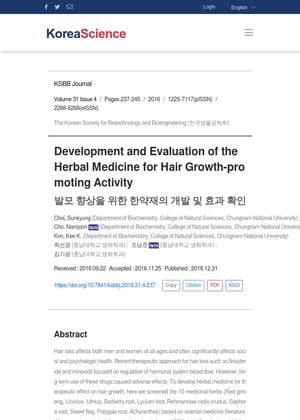TLDR The herbal medicine promotes hair growth and could be an effective treatment.
In 2016, a study was conducted to develop and evaluate a herbal medicine for promoting hair growth. The researchers screened 10 medicinal herbs (Red ginseng, Licorice, Ulmus, Barberry root, Lycium root, Rehmanniae radix crudus, Sophora root, Sweet flag, Polygala root, Achyranthes) based on oriental medicine literature. The herbal medicine was found to have no cytotoxic effects at 1% concentration and increased cell growth at 0.1% concentration. It also demonstrated stronger antioxidant activity than resveratrol and comparable $5-{\alpha}$ reductase inhibitory activity to finasteride. In an in vivo mouse model, the herbal medicine-treated group showed increases in the number and length of hair. The study concluded that the herbal medicine promotes hair growth by its antioxidant activity and inhibitory activity of $5-{\alpha}$ reductase, suggesting it could be a promising hair growth-promoting agent.
 43 citations
,
July 2018 in “Journal of The European Academy of Dermatology and Venereology”
43 citations
,
July 2018 in “Journal of The European Academy of Dermatology and Venereology” Finasteride and minoxidil mix works better for hair growth than minoxidil alone, with similar safety.
 February 2017 in “Vestnik dermatologii i venerologii”
February 2017 in “Vestnik dermatologii i venerologii” Hair loss can be treated with common methods like minoxidil and finasteride, but new potential treatments include growth factors, cytokines, and platelet-rich plasma injections.
 August 2016 in “International journal of scientific research”
August 2016 in “International journal of scientific research” Using minoxidil with finasteride in a cream helps maintain hair thickness after stopping oral finasteride.
 32 citations
,
June 2015 in “Dermatologic Therapy”
32 citations
,
June 2015 in “Dermatologic Therapy” Finasteride and minoxidil together work best for male hair loss.
 5 citations
,
January 2015 in “Journal of clinical & experimental dermatology research”
5 citations
,
January 2015 in “Journal of clinical & experimental dermatology research” MorrF improves hair growth better than minoxidil alone.
 38 citations
,
June 2003 in “Journal of Investigative Dermatology Symposium Proceedings”
38 citations
,
June 2003 in “Journal of Investigative Dermatology Symposium Proceedings” Finasteride effectively improves hair growth and slows hair loss in men with male pattern baldness.
 92 citations
,
October 2002 in “Journal of The American Academy of Dermatology”
92 citations
,
October 2002 in “Journal of The American Academy of Dermatology” Finasteride improves hair loss in women with hyperandrogenism.
 10 citations
,
June 2001 in “PubMed”
10 citations
,
June 2001 in “PubMed” Finasteride is effective in growing hair and stopping hair loss in men with mild to moderate alopecia.
 581 citations
,
October 1998 in “Journal of The American Academy of Dermatology”
581 citations
,
October 1998 in “Journal of The American Academy of Dermatology” Finasteride safely and effectively treats male pattern hair loss, but may cause reversible sexual issues and harm male fetuses.









